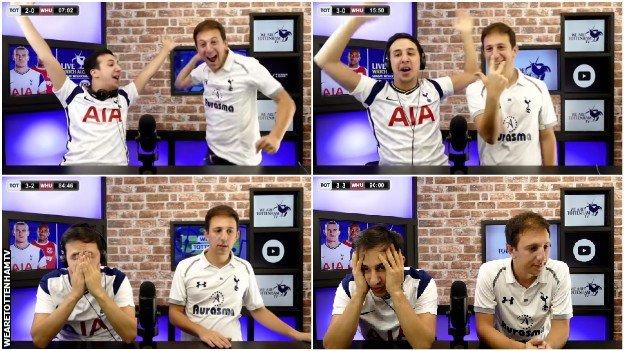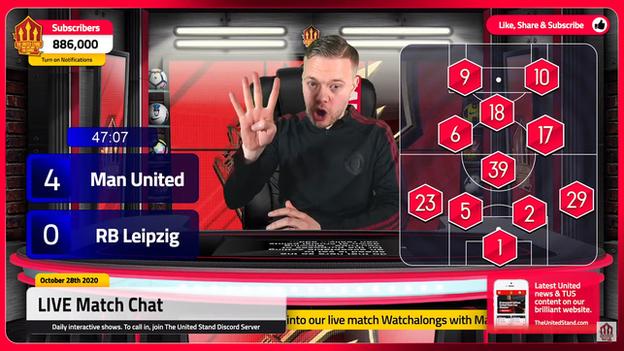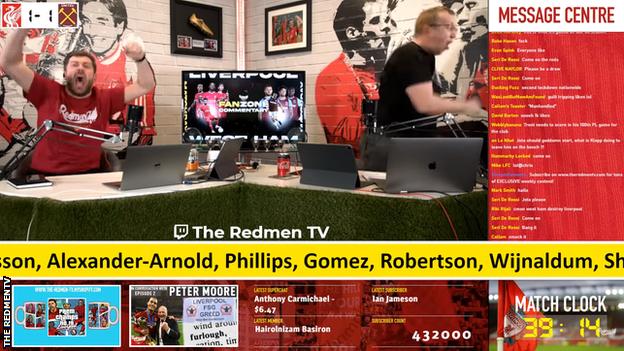Who needs Soccer Saturday? The fans putting it all out there on YouTube
Last updated on .From the section Football


"Lanzini!" exclaims Simeon Daniel before his face crumples in horror. His hands move to his head, flicking his headphones from his ears in grim acceptance. His brother, Ben, breaks the subsequent stunned silence. "Oh no, no, no," he mutters, turning away in disgust.
It is a moment every football fan knows well - the realisation that your side has somehow conspired to throw away a seemingly unlosable position.
What is different about this, though, is that the Daniel brothers have chosen to broadcast their pain at Tottenham relinquishing an 82nd-minute 3-0 home lead over West Ham to the world.
Ben and Simeon are otherwise known as WeAreTottenhamTV and they are part of a phenomenon that has swept football-centric social media - the fan-made watchalong.
Think of it like an amateur online version of Sky Sports' Soccer Saturday, where individuals watch their side's games and describe the action to other fans via a live stream on YouTube, usually wearing club colours and occasionally within a virtual studio of their own making.
You may never have watched one live but if you're a regular user of Twitter you might have come across the viral clips, usually sent out with more than a whiff of schadenfreude by rival fans after things have gone badly wrong.
It begs the question: with a sport that specialises in repeatedly kicking you in the teeth and awash with those waiting to revel in your misery, why on earth would you put yourself out there in this way?
Part of the answer is something all football supporters can understand.
"We just love the club so much," says Simeon, who began WeAreTottenhamTV with his brother three years ago. They have since grown the channel to more than 62,000 subscribers, with an audience varying between 50,000-80,000 for watchalongs. "We are passionate about Tottenham and wanted to turn that passion into something."
"Our whole lives have been so invested in the club," adds Ben. "There was another Tottenham channel before we started but they stopped so there was no Spurs fans' voice on YouTube at that point - somewhere for authentic fans to voice their opinion."
Some channels have earned a reputation for tapping into negativity, something the Daniel brothers balk at. "It's not like we don't call our players out when they don't perform, but we try to have a positive outlook," says Ben.
How then do they feel about rival fans' gleeful mocking of moments like their reaction to Manuel Lanzini's equaliser in the 3-3 draw with West Ham?
"When a clip like the Lanzini one goes viral, I personally have a bit of anxiety," admits Simeon. "Places like ESPN are tweeting it out to millions and everyone is laughing and having a joke. You definitely need a thick skin.
"But then a week earlier we beat Man Utd 6-1 and we get three times the views on the channel that we did against West Ham. People point to the moments where you're leaving yourself open to be ridiculed but when things go well they don't say that.
"And after a couple of days these things always blow over and people move on to the next thing."
WeAreTottenhamTV are just one of many Fan TV channels, competing for attention across a multitude of clubs. Spurs themselves have more than one, including the popular Expressions Oozing.
The watchalongs are just one strand of the content they produce.
There are also interviews, match previews, player ratings and much more - many of the things you might expect from a mainstream media outlet but done out of love, with less filter and on a fraction of the budget.
It used to be the case that supporters with a desire to voice their opinion to the public would write, print and then sell a fanzine outside grounds in the freezing rain. Now, they simply stick on the webcam.
The platform that has most enabled this democratisation of football punditry is YouTube, and just as it has for people who like to demonstrate makeup and play with toys, it has made stars of its creators.
The likes of Arsenal fan Robbie Lyle at AFTV (who have a whopping 1.25m YouTube subscribers) and Liverpool supporter Paul Machin of RedmenTV have become household names to their peers.

One of the biggest stars and a pioneer of fan channels is Mark Goldbridge, whose comedic, impassioned, analogy-packed rants about Manchester United are viral gold.
His channel, The United Stand, was born principally out of a desire to interact and share his post-match thoughts with fellow fans but is now a major undertaking, with a site that comprises videos, podcasts, written content and more.
At last count, they have over 360,000 followers on Twitter and more than 900,000 subscribers on YouTube, responsible for 405m views of content.
"Before I started this, the BBC and its 606 message boards was my go-to place," he says. "After a game you would go on there, type something out and wait 20 minutes for a reply. It was all very slow.
"So I started a show on a Sunday night with a few others where we'd chat and it had a live comments section. There were only about 10 people watching, but you had that instant interaction and that is what The United Stand was born from.
"I used to do an instant match reaction video but because we have an engaged community they kept asking us to do the games live, even if it is just me watching and talking about it.
"It was a weird concept to us but we tried it and it got really popular."
Goldbridge is much milder off air than he is on it, although he admits he still has to keep himself in check sometimes.
"I am probably a lot worse when I am watching a match down the pub," he says. "It is definitely something I have had to hone, because you can't just let loose when you're live. But it is my personality to try to make a joke out of things.
"Some of the things you hear on terraces towards players are vile, which is something I can't do. So I would rather come up with an analogy to get it off my chest that I don't think a player is that good but also do it in a funny way."
Goldbridge's style, coupled with the joy other fans take at seeing Manchester United fail, means he has suffered more than most at the hands of the football trolls, but he sees this as a manageable side-effect of doing something he loves.
"It's a stigma fan channels cannot escape," he says. "If you lose, rival fans are going to jump on it and share it. It comes with the territory. And that territory has been quite consistent for United in the last six years.
"Twitter is the worst place. It's a big audience area for all of us, but it's also not very nice. There isn't a human being alive who wouldn't take time to adjust.
"But you get used to it. Now it is second nature. Like U2 doing a concert, I'm sure it is just one of many."

The success and popularity of channels like The United Stand has enabled Goldbridge and others to turn their passion into a career in what is now a burgeoning industry rivalling mainstream media for online clicks.
Ross Chandley is one of five who work full-time to produce the aforementioned TheRedmenTV, one of Liverpool's most popular fan channels, with 433,000 following them on YouTube.
They have paid subscribers in the thousands, sell their own merchandise and attract sponsors keen to tap into a global following boosted by the club's success on the pitch in recent seasons.
The income from this has helped fuel bigger and bolder content - interviews with players and manager Jurgen Klopp (who admitted to them that he watches their content) and trips abroad to cover the club, including the past two pre-season tours of the United States.
At their heart, though, fan TV channels remain something fuelled by a shared love, a sense of community and a craving for the authentic.
"The thing I like about RedmenTV is that we are talking with you, not at you," says Chandley. "It's about engagement.
"There are a lot of people who can't go to Anfield. We have a big following across the world because we provide context and culture to people who are in love with the club.
"One of the maddest experiences I had is that I went to the Club World Cup in Qatar and someone shouted over to me, 'oh Redmen TV' and it was a guy from Syria.
"He's from a war-torn country and he is getting something from our content to feel more like a Liverpool fan. It blew my mind."

With fans still prevented from attending games in England as a result of the coronavirus pandemic, the provision of a football community away from stadiums has never been more important.
The current nationwide lockdown is due to run until at least 2 December, meaning it will be some time yet before supporters are again able to enjoy the matchday experience with family and friends.
"Some people may not have anyone else to talk to, they might not have a group of friends where they are who are in to the club," adds Chandley. "But we provide somewhere they can go, a place with people they can chat to."
What, then, does the future hold?
Presently, fan channels are not recognised as official media by the Premier League, which denies them the access afforded to mainstream broadcasters.
And while some clubs have shown a willingness to engage, they remain held at arm's length by many and have experienced a degree of frostiness from professional journalists.
But with audiences consuming content in increasingly different ways and in ever greater numbers, could we see a shift from the status quo and more doors opening for fan-led media?
"Fan and mainstream media are very different," says Goldbridge. "I think at the moment we are going through this process where neither really works together.
"There is probably a lack of trust and some [journalists] I have spoken to are wary of it, don't like it and don't respect it but I think they maybe perceive it as a threat. In my mind, both have their place.
"You are always battling with the clubs and mainstream media to some extent. It's not that you crave the respect, more that I don't feel we get it.
"But the growth of fan media is still very big and the bigger you get, the more attention you get. I think at some point the relationship needs to form between us, the clubs and mainstream media.
"Football without fans, as we have seen with lockdown, doesn't work."
Beyond that, the aim is no different to any content provider - growth of audience and bigger, better, more engaging material to serve them.
"There are so many avenues we can go down for content," says Chandley. "We are limited at the moment as we simply don't have the bodies. But we're really proud of what we do and the aim is to expand and get as big as we can."
And on a personal note?
"From my perspective, I get to talk about and travel the world following Liverpool football club," he adds. "This is the best job I have ever had. I'll probably just make the most of it!"

- 6 Degrees from Eddie Hearn: Can the boys track down the boxing promoter?
- One Hit Wonders playlist: The biggest tracks that were never topped



















